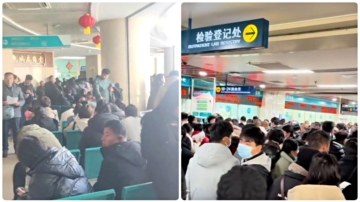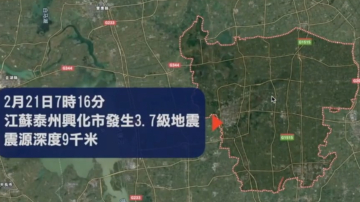【新唐人2013年06月20日讯】国务院星期三公布了全球人口贩卖问题的报告。关于中国的部分,报告说:“中国仍然是被迫劳动和从事性交易的男人、女人和儿童的来源地、中转地和目地地。”中国过去连续9年,被美国列入人口贩卖的监视名单,并且被划在第二个等级。在今年的报告中,中国降到了第三个等级。而人口贩卖问题的报告中也再次抨击了中共的劳教制度。
《2013年人口贩卖问题报告》说,中国境内两亿多流动人群中的人口贩卖情况很招摇。大部分人口贩卖发生在中国境内,在那里的男子、妇女和儿童被强迫劳动和卖淫。
报告中指出,中国(共)政府未能完全遵守消除人口贩卖的最低标准,过去连续9年,在被监视名单中,被划在第二个等级。
中国“东南大学”法学教授张赞宁表示,贩卖人口事例年年发生,而政府对贩卖人口的处罚力度不够。
中国东南大学法学教授张赞宁:“为甚么会发生这种情况,主要原因,一个就是中国的就业问题很难;第二个就是:贫富差距越来越大,一些贫困阶层他不得不铤而走险,做这个违法的事情;第三个原因,也是最主要的原因,就是中国社会道德沦丧,道德越来越滑坡。很多人为了唯利是图,经常超越道德的底线。”
大陆媒体报导,江西抚州籍熊某等6名熊氏成员组成的拐卖、强迫妇女卖淫团伙,自今年3月起,先后从广东深圳、东莞等地,拐卖谭某等13名妇女到休闲娱乐场所从事卖淫活动,从中每次收取70元至100元。截至案破时,共收取强迫卖淫非法所得4万多元。
原《河北人民广播电台》编辑朱欣欣认为,人口贩卖带来的一系列问题,跟中国经济发展有密切关系。
原《河北人民广播电台》编辑朱欣欣:“因为各地经济发展不平衡,分摊到人均人口上就很低。尤其在中国落后的地区,劳动力剩馀比较多,还有人口的素质问题,素质低,他在劳动市场竞争处于劣势,找不到工作,这样这些人就通过其他非正常手段来谋取财富。这样就为人贩子提供条件。”
另一方面,在强迫劳工劳动问题上,美国的这份报告指出,由国家所支持的强迫劳动是所谓劳动教养制度的一部分。据报导,中共政府会从中牟利。在至少320个这种劳教场所里,对许多劳动教养所的囚犯和被拘禁者来说,经常分文不取。被囚禁者有时因完成不了工作量而遭殴打。
张赞宁指出,中共的劳教制度超越了宪法,因此,劳教制度本身不合法。
张赞宁:“中国的宪法或法律都明确规定,人身自由是不受侵犯的。但是劳教制度就超越了这一条法律,它可以不经过法院、检察院决定和批准,直接由公安部门限制公民的人身自由,这是违法的,也是违宪的一个行为。”
去年12月26号,《福克斯》新闻网报导说,美国俄勒冈州一名母亲朱丽叶•凯斯(Julie Keith)在她购买的万圣节装饰物当中,发现一封求救信。
信中说:“这个万圣节产品是在中国沈阳马三家劳教所制作的,那里犯人被迫一天工作15个小时,没有周末和节假日休息。几乎没有工资,每个月只有10元人民币。”
这封信,再次揭开了中共当局广设劳教所的实际黑幕。
采访编辑/唐睿 后制/黎安安
China Listed on the US Trafficking in Persons Report
The U.S. State Department released the global
human trafficking report on Wednesday.
Regarding China it says, "China is still the origin,
transitional station and destination of forced labor and
sex trade for men, women and children.
For nine consecutive years, China has been on the
trafficking watch list, and is classified in the second level, this year is
in the third level.
The report also criticized China's labor re-education system.
Trafficking in Persons Report 2013 says
human trafficking is open and
bold among over two hundred million migrants in China.
Most trafficking occurred in China, where men, women
and children are forced to do labor and sex work.
The Report points out that Chinese (CCP) government
failed to fully comply with minimum standards
to eliminate trafficking over the past nine consecutive years.
On the monitored list China is in the second grade.
Zhang Zanning, law professor at China Southeast University,
said that serious human trafficking exists in China every year,
but the government has insufficient penalties.
Zhang Zanning:"Why is there such a situation?
A main reason is China's employment problem,
and a second one is the growing wealth gap.
Some of the poorer people have to take risks
on illegal practices.
And the third and most important reason is
China's social and moral turpitude like a moral landslide.
Lots of people become mercenaries,
frequently going beyond bottom line of morality."
Mainland media reported that six men surnamed Xiong
in Jiangxi province formed a forced prostitution gang.
Since March this year, they trafficked 13 women from
Guangdong and other places to be prostitutes in entertainment centers.
For each of the sex transactions, they obtain 70 to 100 yuan.
At the time of arrest, they had profited over 40,000 yuan
from the forced prostitution.
Former editor at Hebei People's Radio, Zhu Xinxin, said
human trafficking has close connections with
China's economic development.
Zhu Xinxin:"Because local economies develop unevenly,
the per capita income is rather low.
Especially in less-developed areas,
there is more surplus labor.
Since they are less competitive in the labor market,
they cannot find jobs.
As a result, they resort to abnormal means to seek wealth,
thus providing the conditions for human trafficking."
On the other hand, the U.S. report points out that
state-sanctioned forced labor is part of
the so-called labor education system.
Chinese government reportedly profits from the practice.
In at least 320 such camps, the inmates usually
receive nothing from their work.
Very often they are seriously beaten for
failing to complete assigned work.
Zhang Zanning pointed out that Chinese Communist
regime's labor education system is against the constitution, and thus is itself illegal.
Zhang Zanning:"China's Constitution and other laws
explicitly protect human freedom, but the labor camp system goes against this principle.
Without prosecution or court judgment, the public security
departments can deprive individual freedom at will.
This is not only illegal, but also unconstitutional."
Dec. 26 last year, Fox News reported that an Oregon mother,
Julie Keith, found an SOS letter in her Halloween decoration kit.
The letter said, "This Halloween product is made
in Masanjia labor camp in Shenyang, China.
People who work here have to work 15 hours a day
without Saturday, Sunday or any holiday break.
There is almost no salary, only 10 yuan a month."
This letter once again exposed the truth about the shady
labor camps Chinese authorities have established nationwide.
《2013年人口贩卖问题报告》说,中国境内两亿多流动人群中的人口贩卖情况很招摇。大部分人口贩卖发生在中国境内,在那里的男子、妇女和儿童被强迫劳动和卖淫。
报告中指出,中国(共)政府未能完全遵守消除人口贩卖的最低标准,过去连续9年,在被监视名单中,被划在第二个等级。
中国“东南大学”法学教授张赞宁表示,贩卖人口事例年年发生,而政府对贩卖人口的处罚力度不够。
中国东南大学法学教授张赞宁:“为甚么会发生这种情况,主要原因,一个就是中国的就业问题很难;第二个就是:贫富差距越来越大,一些贫困阶层他不得不铤而走险,做这个违法的事情;第三个原因,也是最主要的原因,就是中国社会道德沦丧,道德越来越滑坡。很多人为了唯利是图,经常超越道德的底线。”
大陆媒体报导,江西抚州籍熊某等6名熊氏成员组成的拐卖、强迫妇女卖淫团伙,自今年3月起,先后从广东深圳、东莞等地,拐卖谭某等13名妇女到休闲娱乐场所从事卖淫活动,从中每次收取70元至100元。截至案破时,共收取强迫卖淫非法所得4万多元。
原《河北人民广播电台》编辑朱欣欣认为,人口贩卖带来的一系列问题,跟中国经济发展有密切关系。
原《河北人民广播电台》编辑朱欣欣:“因为各地经济发展不平衡,分摊到人均人口上就很低。尤其在中国落后的地区,劳动力剩馀比较多,还有人口的素质问题,素质低,他在劳动市场竞争处于劣势,找不到工作,这样这些人就通过其他非正常手段来谋取财富。这样就为人贩子提供条件。”
另一方面,在强迫劳工劳动问题上,美国的这份报告指出,由国家所支持的强迫劳动是所谓劳动教养制度的一部分。据报导,中共政府会从中牟利。在至少320个这种劳教场所里,对许多劳动教养所的囚犯和被拘禁者来说,经常分文不取。被囚禁者有时因完成不了工作量而遭殴打。
张赞宁指出,中共的劳教制度超越了宪法,因此,劳教制度本身不合法。
张赞宁:“中国的宪法或法律都明确规定,人身自由是不受侵犯的。但是劳教制度就超越了这一条法律,它可以不经过法院、检察院决定和批准,直接由公安部门限制公民的人身自由,这是违法的,也是违宪的一个行为。”
去年12月26号,《福克斯》新闻网报导说,美国俄勒冈州一名母亲朱丽叶•凯斯(Julie Keith)在她购买的万圣节装饰物当中,发现一封求救信。
信中说:“这个万圣节产品是在中国沈阳马三家劳教所制作的,那里犯人被迫一天工作15个小时,没有周末和节假日休息。几乎没有工资,每个月只有10元人民币。”
这封信,再次揭开了中共当局广设劳教所的实际黑幕。
采访编辑/唐睿 后制/黎安安
China Listed on the US Trafficking in Persons Report
The U.S. State Department released the global
human trafficking report on Wednesday.
Regarding China it says, "China is still the origin,
transitional station and destination of forced labor and
sex trade for men, women and children.
For nine consecutive years, China has been on the
trafficking watch list, and is classified in the second level, this year is
in the third level.
The report also criticized China's labor re-education system.
Trafficking in Persons Report 2013 says
human trafficking is open and
bold among over two hundred million migrants in China.
Most trafficking occurred in China, where men, women
and children are forced to do labor and sex work.
The Report points out that Chinese (CCP) government
failed to fully comply with minimum standards
to eliminate trafficking over the past nine consecutive years.
On the monitored list China is in the second grade.
Zhang Zanning, law professor at China Southeast University,
said that serious human trafficking exists in China every year,
but the government has insufficient penalties.
Zhang Zanning:"Why is there such a situation?
A main reason is China's employment problem,
and a second one is the growing wealth gap.
Some of the poorer people have to take risks
on illegal practices.
And the third and most important reason is
China's social and moral turpitude like a moral landslide.
Lots of people become mercenaries,
frequently going beyond bottom line of morality."
Mainland media reported that six men surnamed Xiong
in Jiangxi province formed a forced prostitution gang.
Since March this year, they trafficked 13 women from
Guangdong and other places to be prostitutes in entertainment centers.
For each of the sex transactions, they obtain 70 to 100 yuan.
At the time of arrest, they had profited over 40,000 yuan
from the forced prostitution.
Former editor at Hebei People's Radio, Zhu Xinxin, said
human trafficking has close connections with
China's economic development.
Zhu Xinxin:"Because local economies develop unevenly,
the per capita income is rather low.
Especially in less-developed areas,
there is more surplus labor.
Since they are less competitive in the labor market,
they cannot find jobs.
As a result, they resort to abnormal means to seek wealth,
thus providing the conditions for human trafficking."
On the other hand, the U.S. report points out that
state-sanctioned forced labor is part of
the so-called labor education system.
Chinese government reportedly profits from the practice.
In at least 320 such camps, the inmates usually
receive nothing from their work.
Very often they are seriously beaten for
failing to complete assigned work.
Zhang Zanning pointed out that Chinese Communist
regime's labor education system is against the constitution, and thus is itself illegal.
Zhang Zanning:"China's Constitution and other laws
explicitly protect human freedom, but the labor camp system goes against this principle.
Without prosecution or court judgment, the public security
departments can deprive individual freedom at will.
This is not only illegal, but also unconstitutional."
Dec. 26 last year, Fox News reported that an Oregon mother,
Julie Keith, found an SOS letter in her Halloween decoration kit.
The letter said, "This Halloween product is made
in Masanjia labor camp in Shenyang, China.
People who work here have to work 15 hours a day
without Saturday, Sunday or any holiday break.
There is almost no salary, only 10 yuan a month."
This letter once again exposed the truth about the shady
labor camps Chinese authorities have established nationwide.










